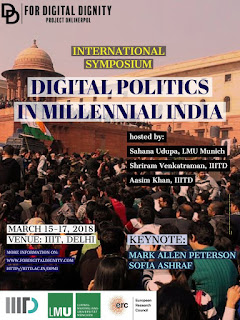New article out in the International Journal of Communication

I am thrilled by this new article with my former Master's student Linnea Thompson, one of the brightest students I have come across over these years. A dream collaboration which went smoothly and resulted in a publication with a top tier journal in the Communications field - the International Journal of Communication We got to present this in Manchester for the Digital Economies workshop organized by Richard Heeks, a fantastic platform for sharing this work. The article, Crowdsourcing as a Platform for Digital Labor Unions is about how crowdsourcing is used as a tool to reconfigure relations between outsourced factory workers and corporations through innovative platform designs and the challenges that ensue. Below is the full abstract and link to the full paper: Global complex supply chains have made it difficult to know the realities in factories. This structure obfuscates the networks, channels, and flows of communication between employers, workers, nongov...




